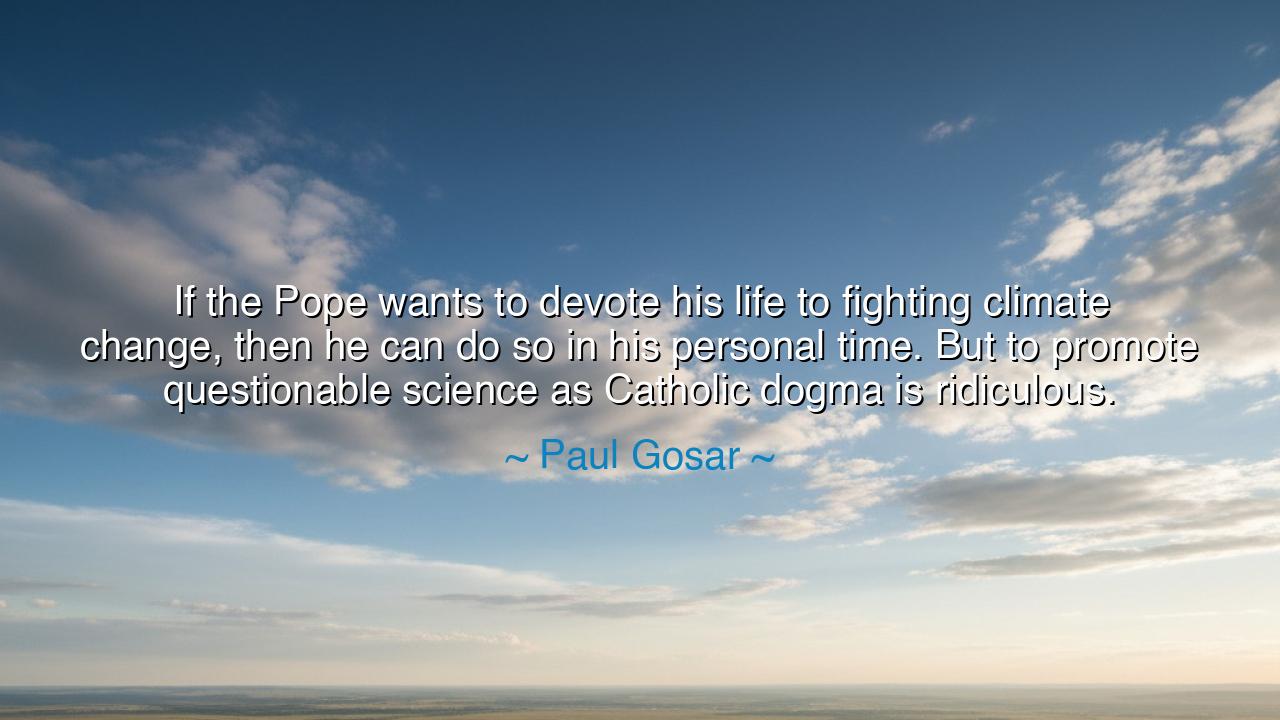
If the Pope wants to devote his life to fighting climate change
If the Pope wants to devote his life to fighting climate change, then he can do so in his personal time. But to promote questionable science as Catholic dogma is ridiculous.






"If the Pope wants to devote his life to fighting climate change, then he can do so in his personal time. But to promote questionable science as Catholic dogma is ridiculous." These words, spoken by Paul Gosar, stir the waters of debate, touching on the delicate intersection between science, religion, and authority. Gosar’s statement speaks to the tension that often arises when scientific matters, such as the issue of climate change, are embraced and promoted by figures of authority, such as the Pope. At the heart of his words is a call to separate personal belief from institutional power, and a reminder that science—though an essential and noble pursuit—is best left to the scientific community rather than becoming entwined with religious dogma.
In the ancient world, there was a constant struggle between faith and reason, between divine authority and the pursuit of knowledge. Socrates himself was condemned by the authorities of his time, not for advocating the truth, but for challenging the beliefs that were held by the powerful, including the gods of the city. Socrates was a lover of truth, and his method of inquiry often led him to question the very foundations of the Athenian belief system. His fate is a reminder that the pursuit of knowledge and reason can often clash with those in power who wish to protect established dogma. Similarly, Galileo Galilei found himself at odds with the Church for presenting scientific truths that contradicted the geocentric model of the universe, which had been accepted as doctrine. In both cases, the conflict between science and religion arose not out of malice, but because the truths of nature often challenge the fixed beliefs that rulers or institutions hold.
Gosar’s assertion reflects a modern version of this ancient tension. He argues that while individuals, such as the Pope, are free to hold personal beliefs about issues like climate change, it is dangerous to promote those beliefs as universal truths, particularly when they are presented as part of religious dogma. History has shown us time and again that when science is held up as dogma—when it is framed as an unquestionable truth that must be adhered to without examination—the pursuit of knowledge becomes warped. The lesson of Galileo is a powerful one: the truth of science is not found in the edicts of the powerful but in evidence, reason, and inquiry. When science is tethered to ideology or power, it risks losing its purity and its capacity to uncover the truth.
Consider the story of Luther and the Reformation, when Martin Luther, a monk, broke from the Catholic Church because he believed that the Church’s doctrine had strayed from the true teachings of Christianity. Luther did not reject faith or spirituality; rather, he sought to return to the truth of scripture and a more personal relationship with God. In the same way, the modern scientific community must remain free from the shackles of dogma. If science becomes intertwined with politics or religion, it can no longer fulfill its true purpose: to seek the truth, to test hypotheses, and to explore the unknown.
In our time, the question of climate change has become a central topic of both scientific and political debate, and it is easy to understand why passionate individuals—including religious leaders—would take strong stands on the issue. Yet science, like religion, must remain free from the influence of ideology. The scientific method, at its core, requires the freedom to question, to test, and to reexamine what we know. When climate change is presented not as a scientific theory to be debated, but as a dogmatic belief that must be accepted without question, we are at risk of falling into the same trap that Galileo and Luther faced—where the pursuit of truth is compromised for the sake of power or authority.
Gosar’s words also serve as a reminder of the importance of personal autonomy in both religious and scientific matters. The Pope, as a spiritual leader, is entitled to his own personal beliefs and convictions about climate change or any other issue. However, when those beliefs are presented as unquestionable truths, we risk creating a world where freedom of thought and the pursuit of scientific discovery are restricted by the weight of institutional power. The true power of science lies not in its acceptance as a belief system, but in its ability to challenge, to question, and to continuously refine our understanding of the world.
The lesson, then, is clear. The truth of science cannot be dictated by any individual or institution, no matter how powerful or revered they may be. Just as Socrates and Galileo challenged the authorities of their time to seek knowledge beyond the bounds of tradition, so must we embrace science as a dynamic process, one that seeks understanding through evidence, reason, and free inquiry. While we must respect personal beliefs, we must also recognize the vital role that science plays in shaping the world and in guiding our understanding of complex issues like climate change. To embrace science is to embrace the pursuit of truth, not dogma, and it is only through this pursuit that we can continue to progress as a species.






AAdministratorAdministrator
Welcome, honored guests. Please leave a comment, we will respond soon